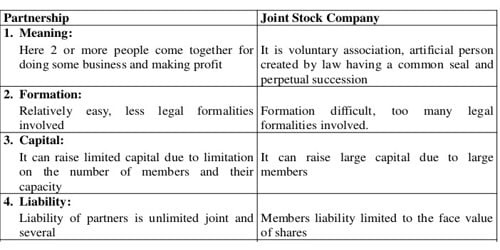Differences between Joint Stock Company and Partnership Business
A company that operates its business by getting combined capital, limited liability, having a distinct personality and perpetual succession by law is called a Joint Stock Company. On the other hand, two or more persons taking unlimited liabilities for the purpose of earning a profit, being operated by all or by one on the behalf of all on the basis of the agreement is called partnership business. Though both businesses are formed by many people, there are many differences between them as well because of the characteristics and the fields of operations or floors of functions are as follows:
Joint Stock Company
- Formation: A company can be formed only after fulfilling legal formalities and its incorporation under the Act is essential. A joint-stock company is created by registration under the Companies Act- 1994.
- Legal Status: A company has a separate legal entity independent of its members. A joint-stock company is a legal person and regarded by law as having an Artificial Personality.
- A number of members: A private company must have at least two members and a maximum of 50 members.
- Contractual Capacities: The shareholders of a company can enter into a contract with the company and can be employees of the company.
- Statutory obligations: A company is required to comply with various statutory obligations regarding the management e.g. filing a balance sheet, maintaining prescribed registers.
- Liability: The liability of a member of a company may be limited by shares or by guarantee.
- Transferable of shares: Shares in a company are freely transferable unless the company’s constitution is provided restrictions, of course, appear in the articles of a private company.
- Mutual right: The members of the Board of Directors are elected by the direct polling of the vote of the shareholders.
- Profit Distribution: Profits in the case of a company can be distributed according to the provision of the articles of the company act.
- Audit: Audit in the case of a company is compulsory. A company must maintain its accounts in the prescribed form and must get them audited by a qualified auditor.

Partnership Business
- Formation: In the formation of partnership no legal formalities are involved and registration of the firm is not compulsory. A partnership is created by an agreement that may be expressed or implied from the conduct of the partners and is subject to the Partnership Act-I932.
- Legal Status: Partnership is not a legal person and partnership is the partners who own the property of the firm and liable for the contracts of the partnership firm jointly. A partnership firm has no separate legal entity different from its partners. Partners and the firms are one and the same in the eyes of law.
- The number of members: A partnership consists of a minimum of 2 and maximum of 20 persons (maximum 10 persons for banking business).
- Contractual Capacities: Partners can contract with other partners but not with the firm as a whole.
- Statutory obligations: In the case of a partnership, there are no statutory obligations in the business activities.
- Liability: The liability of a canner is unlimited.
- Transferable of shares: A partner can transfer his shares in the firm, but the assignee does not become a partner and is merely entitled to the assigning partner’s share of the profits.
- Mutual right: A little formality is needed to elect the Board of Directors. Sometimes partners are responsible for conducting business activities.
- Profit Distribution: Profits of a firm are distributed in agreed proportion or equally in the absence of agreement among the partners.
- Audit: In case of partnership firm audit is not compulsory. Accounts and audit are not obligatory for a partnership unless the total sales turnover or gross receipts in a year exceed (Money amount).
From the above discussion, we can say that there are vast differences between the two types of business and hence anyone should study in detail the pros and cons of both companies as well as a partnership before taking any decision on whether to enter into a partnership or incorporate a company. Joint Stock Company is a large, up to date perpetual succession and all over recognized business organization. On the other side, the Partnership business is a small and medium business organization confined by various limitations and operated on the basis of agreement.
















